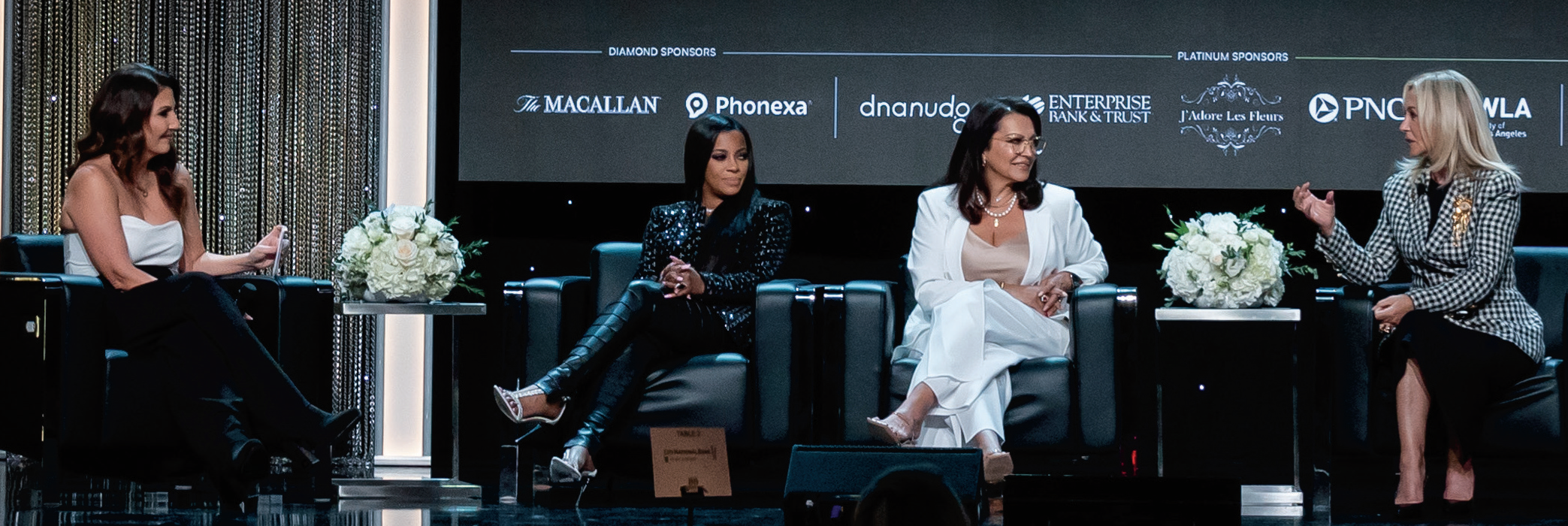
Successful entrepreneurs in the beauty and fashion sectors wowed the audience for the last panel of the afternoon. The panelists shared their secrets for establishing iconic brands as well as how they go about maintaining their brand authority. With entrepreneurs ranging from the creators of long-established brands to recent buzzworthy additions, the engaging conversation was filled with equal parts insight and fun.
 Moderator
Moderator
Anna Magzanyan
Chief Strategy & Revenue Officer and Chief of Staff to Executive Chairman
Los Angeles Times
Jessica Rich 
CEO
Jessica Rich
Fashion mogul and self-made entrepreneur Jessica Rich rose to notoriety after debuting her first collection, Transparent, in 2017. Since the brand’s initial collection, she continues to curate new designs, expand her business and grow beyond a renowned luxury name within the industry – defining herself and her brand as an international sensation with loyal customers and admirers across the globe. Rich is proud to represent Black footwear designers, and her mission is to push the boundaries of the fashion industry and encourage others, especially women, to reach for their dreams and never give up.
 Rea Ann Silva
Rea Ann Silva
Founder & CEO
Beautyblender
Rea Ann Silva’s nearly 30-year journey as one of the most sought-after Hollywood makeup artists in the industry led her to creating Beautyblender, single-handedly changing the beauty game. The Beautyblender concept came to Silva while she was the department head of one of the first TV shows shot in high definition, where she handled constant touch-ups with her hand-cut, edgeless sponges to mimic the seamless look of airbrushing. Today, the category-creator holds countless beauty awards and is beloved by both makeup aficionados and newbies as the go-to tool for achieving a perfectly blended complexion. In November 2020, she was honored at the Smithsonian in the “Only One in The Room” exhibit, celebrating the 100th anniversary of women’s suffrage.
 Anastasia Soare
Anastasia Soare
CEO
Anastasia Beverly Hills
Beauty pioneer, creative visionary and powerhouse entrepreneur Anastasia Soare is founder, CEO and the driving force behind Anastasia Beverly Hills. Soare immigrated to the U.S. from Romania to fuel her entrepreneurial vision and unique approach to beauty. In 1990, she introduced a new “brow-shaping” service to clients – later patented as the Golden Ratio method – that has gone on to become a staple service. Soare continues to push boundaries today, expanding beyond the brow category with the company’s leading prestige cosmetics line. Her belief in beauty’s power to transform extends to her lifelong work for women and children and the establishment of The Anastasia Brighter Horizon Foundation, which supports and advances the lives of young adults exiting the foster care system.
‘‘Timing is such an important thing for any entrepreneur, to be able to be intuitive, get ahead of the curve and be there at the right time.”
- Rea Ann Silva
Shared Insights from the Event
ON BUILDING A BRAND FROM THE GROUND UP
Anastasia Soare: I could start with “inventing eyebrows.” [What I created] was a new category in the beauty business, then I created products. There were no products for eyebrows when I started. In 2000, I started selling in Nordstrom and doing services, which department stores didn’t used to do. Then, of course, my “Oscar” moment, when I was on Oprah’s show talking about eyebrows.
ReaAnn Silva: I was a makeup artist, I started out in music videos, then did makeup for print editorial and moved into film and television. When I created the Beautyblender sponge applicator, it was because high definition was the future. Suddenly, you could see everybody’s makeup! That’s when I started cutting sponges to use them to create a more flawless look. And I thought, “Well, I can’t sit in this makeup trailer forever. So what am I going to do?” I wanted to start a business. And I thought that I would sell the sponges only to makeup artists that would understand the product and where we were going technologically. But here I am, 20 years later with a huge consumer base.
Jessica Rich: I fell into doing shoes. It was never my forte. I was doing PR and marketing for other brands and then I realized after my contract would end, I’d realize, “Oh, I don’t have any equity in the company. I made them sales, I put them on celebrities and that’s it.” So I just started my business, not even knowing how to run a business. But when I sat and thought about what I needed as a person, thinking like a personal shopper looking at what I needed in my own closet, what do I need every day that I don’t see in the marketplace? So, I just went with my heart and started making very sexy, high-end shoes that do not have the high-end price tag.
Silva: And I believe that timing is such an important thing for any entrepreneur, to be able to be intuitive, get ahead of the curve and be there, you know, at the right time where you can have this maximum kind of impression.
Soare: Yes! I always say this, too. Opportunities are always everywhere. You just need to see them and to be prepared to take that opportunity when it comes to you.
ON PROTECTING A BRAND ONCE IT IS ESTABLISHED
Rich: My first shoe that went viral was my clear Cindy shoe. The pump was my first design and that’s the one that really made me who I am. And then it was replicated all over the world. That copying used to bother me a lot and I used to get very discouraged. I used to cry. But then I realized I needed to just keep going to the next thing. You are the one people are watching what you’re doing. They have to wait for you to do it first for them to replicate it. If you’re always a step ahead, you should be okay.
Silva: In my case, Beautyblender was acategory creator, so nothing ever existed like that before. And unfortunately, I did not get a patent for Beautyblender. And so you see so many Beautyblender copycats on the market. Now, I have attorneys and we do have patents for all my other products and everything else and we have trademarks as well. So I do have brand protections, but I spend money and time with my attorneys making sure that I am aware of the competition that is out there, because I have to be aware of who’s infringing on my brands. I spend all of my time making sure people know that we are the original category creator.
Soare: My advice, the best advice that I got from a patent attorney was, “You cannot fight. It’s going to cost you money. The best way to protect your brand is to make your brand the one that everybody thinks of. When they think of eyebrows, they will think of Anastasia.” I find imitation not only is the best way of flattering, but it always forces you to come with something new all the time. The competition will need one year to come up with a copy. I think the most important thing that we all need to leave this interview with is the idea that whatever you want to launch or whatever is your brand, your product has to be something you love, you have to believe in it. And don’t take no for an answer! A million people could tell you, “No, I don’t think this will work.” Ignore that. If you believe in your product, just don’t give up.

To view or share this content online, use this QR code.